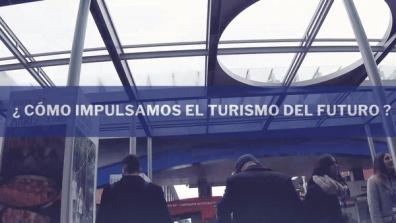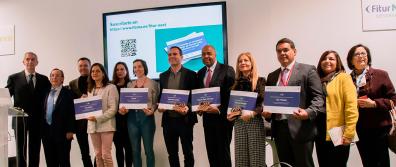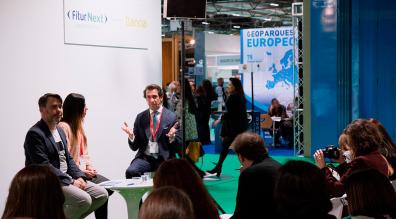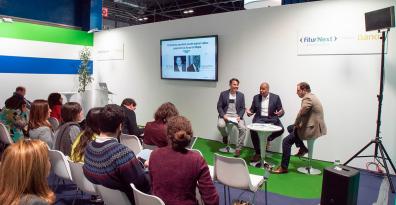
The FITURNEXT Observatory at the FITUR 2020 Fair
In this edition of FITUR 2020 we presented a variety of high-level speakers, dialogues on replicability and hosted a space for those seeking to generate value and contribute to local economic development. In addition, we held the awards ceremony of the FITURNEXT 2020 Challenge and launched the next year's challenge: How can tourism contribute to gender equality and women's empowerment?
From the FITURNEXT Observatory we brought visitors to the various initiatives that were part of the 2020 Challenge: How can tourism contribute to local economic development?, with several activities and presentations held by experts. The highlights of FITURNEXT 2020 have been many.

Winner's ceremony and the new challenge
The presentation of the FiturNext 2020 Report: How tourism can contribute to local economic development resulted in the awards ceremony for the winning initiatives of this first edition (Sponsor an Olive Tree, Starlight Foundation and Soap for Hope, by Diversey). The awards were delivered along with a presentation of how each initiative has great potential to be replicated and make a positive impact on local economic development. Special mentions were also given to the finalists that were present: Vías Verdes (Green Tracks), Totonal and the Wallata Plan.
Later on, Javier Creus and Dr. Mara Balestrini, Coordinators of FITURNEXT, announced the new FITURNEXT 2021 Challenge: How can tourism contribute to gender equality and the empowerment of women? for relevant initiatives to start applying.

Talks and presentations
Under the title A more empowered traveler will change the rules of future tourism, a dialogue took place between Fernando Gallardo, Hotel Critic at EL PAÍS and Dr. Mara Balestrini, CEO of Ideas for Change. In this conversation, the increasingly active role of travelers and their impact on the industry as a whole has been analysed, as well as the weight that technology has in this role.
The talk Smart Destinations, Destinations with a Future between Antonio López de Ávila, President & CEO of Tourism Data Driven Solutions (TDDS) and President of Turisfera; Edurne Vidal, Responsible for the Intelligent Tourist Destinations Programme, Segittur; and Francisco Rodríguez, Researcher at FITURNEXT. The need for a strategic vision, programming, responsibility, control, cooperation and transparency in both the private and public sector, together with citizen participation, were the main highlights of the discussion. The replicability for which FITURNEXT bets on is also an intrinsic factor of intelligent destinations, where good practices are already shared by Segittur.
Furthermore, Jesús Navarro, CEO of INNSAI, Expert in competitive intelligence and Consultant in innovation and strategy, presented Trends that will change the tourism business model. He is also one of the creators of BANKIA Forward. In this conference, Jesús told us how things are slowly changing in a direction which modifies both the behavior of market players, and the user experience based on technology and personal identity that leads to market hypersegmentation.

Dialogues among finalists
Three dialogues took place among the winners of the FITURNEXT 2020 Challenge on how tourism can contribute to local economic development and initiatives that replicate them. This session revealed the potential of this Sustainable Development Goal for the future of tourism.
The first dialogue was held by Alberto Alfonso Pordomingo, founder of Sponsor an Olive Tree; and Fermín Serrano Sanz, Commissioner for the 2030 Agenda of the Aragonese Government; where he has explored how underutilised resources can favour tourist attraction and combat depopulation.
The second was Antonia M. Varela Pérez, Managing Director of Starlight Foundation together with Asier Morterero Franco, Representative of the Posada del Candil (Almería), a Starlight accommodation, and part of its network. The round table discussed the wealth that exists in the starry sky and the importance of astrotourism as a differentiation point and destination-creator.
The last dialogue of Thursday's programme was titled Tourism can also save lives. This round table shared the experience of Soap for Hope, in which Tomás Franquet, Director of Corporate Responsibility at Meliá Hotels and Pascal Jean-Michel, Director of International Accounts at Diversey, explained how their soap saves lives and empowers women in vulnerable situations. In addition, this initiative rescues tons of soap remnants that are thrown away every day in the hotel sector, thus supporting the circular economy.
On Saturday, when the doors were open to the general public, FITURNEXT 2020 presented a panel with some of the initiatives that won the How can tourism contribute to local economic development? Challenge. These are Arantxa Hernández, representing Vías Verdes, an initiative that promotes sustainable rural development in Spain through tourism and the use of existing infrastructure, such as the old train tracks; Ángela Rodríguez from Totonal, a Mexican company that works with local cooperatives to design customised trips; and Maria del Carmen de Reparaz from Plan Wallata, a project promoted by Turismo Cuida that protects the cultural and natural heritage of Ollantaytambo (Peru) through sustainable tourism.
Another highlight was the launch of the Global Tourism Plastics Initiative, presented by members of the United Nations' World Tourism Organization and One Planet COMM. The initiative was introduced with two key messages: it is time to accelerate sustainability and, therefore, the starting point to transform the way in which the business is done. Among others, representatives from France and Spain spoke, countries which receive the greatest flow of visitors; and Kenya, the first Sub-Saharan country to ban plastic bags.
You can find more information about the Observatory and the new challenge in https://www.ifema.es/fitur-next




